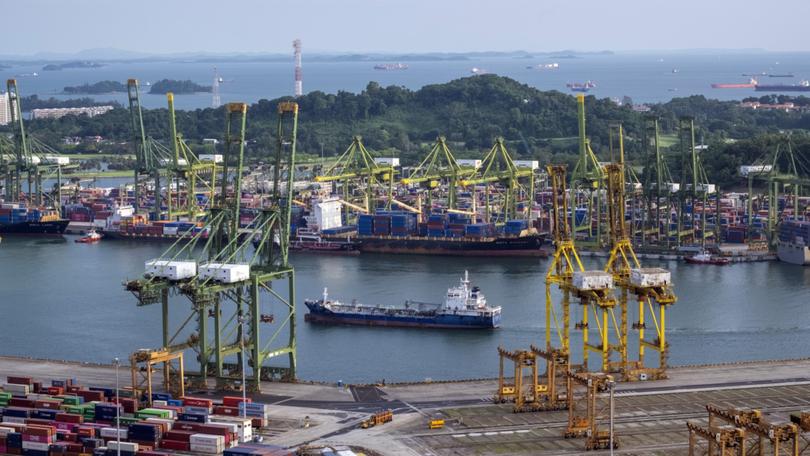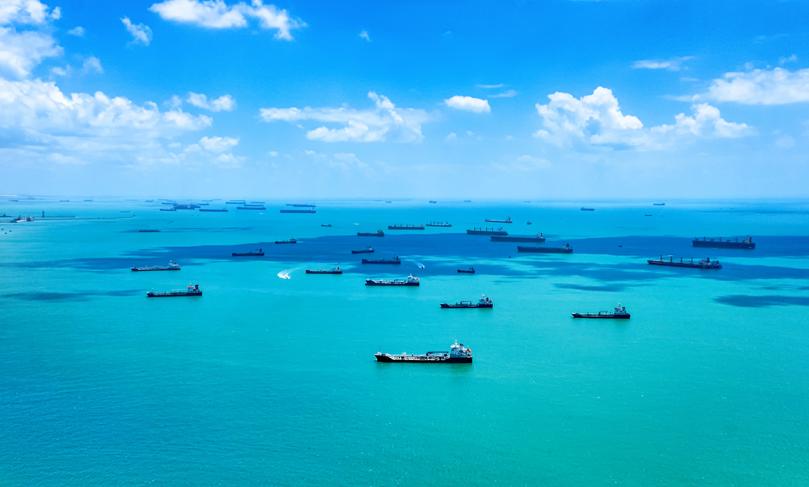Shipments to Australia impacted by Red Sea crisis amid mounting congestion at the Port of Singapore
The ongoing war between Israel and Palestine is impacting shipments to Australia of goods including car parts and accessories, clothing, house and bathroomware, furniture, packaging and non-perishable food.

The ongoing war between Israel and Palestine is impacting shipments to Australia of consumer goods including car parts and accessories, clothing, house and bathroomware, furniture, packaging and non-perishable food.
Major brands including Swedish homewares giant Ikea and Australian hardware chain Bunnings are preparing themselves against possible product shortfalls as container vessels divert from the Red Sea amid ongoing aerial attacks by the Iran-backed Houthi rebels.
The forced diversion from the Red Sea, a crucial maritime corridor, around the Cape of Good Hope in South Africa is causing increasing congestion at the Port of Singapore, one of the largest shipping hubs in the world and the major freight point between Asia and Australia.
Sign up to The Nightly's newsletters.
Get the first look at the digital newspaper, curated daily stories and breaking headlines delivered to your inbox.
By continuing you agree to our Terms and Privacy Policy.Industry figures have warned Australian businesses to order international stock months earlier as international freight times blow out by more than a week and freight prices more than double.
EES Shipping managing director Brian Hack said pretty much all products shipped in 20-foot or 40-foot containers had been impacted amid mounting congestion at the Port of Singapore.
In addition to the Red Sea conflict, Mr Hack said congestion was also being fuelled by businesses shipping Chinese products ahead of incoming US tariffs on imports from the Asian superpower due to start on August 1.
“All of this has led to a lot of backlog in Singapore, probably the biggest trans shipping hub in the world,” he said.
“What used to be a one, two day turnaround is pushing out seven to 10 days.”
International maritime consultancy Drewry has reported the Port of Singapore’s container terminal utilisation rate nearly hit 90 per cent in May due to route and schedule changes.
And global shipping schedule reliability has fallen from 65 per cent to 50 per cent compared to the same period last year, according to data released by analyst Sea-Intelligence.
Ports Australia chief executive officer Mike Gallacher said most of Australia’s shipping was to and from Asia and said that delays at North Asian ports would naturally flow onto Australian services.
“We have not heard that this [Red Sea conflict] is causing any significant delays to Australian Ports, but it could cause some delays to freight,” he said.
Vessels travelling to and from Asia to Europe have rerouted since Iran-backed Yemen-based Houthi rebels launched an airstrike campaign against Israel in the Red Sea that has killed at least four mariners and sunk two vessels since November last year.
The US Defense Intelligence Agency has reported that container shipping through the Red Sea, a vital maritime corridor, has fallen by about 90 per cent.

Ikea Australia country customer fulfilment manager Katya Somova said the Swedish homewares giant had experienced some delays and was ordering additional stock to avoid product shortages.
“IKEA Australia has experienced some delays in receiving stock due to the Red Sea crisis, which caused bottlenecks between Europe and China,” she said.
“IKEA Australia has triggered orders earlier and increased order quantity. We also plan to order stock earlier into our DC [distribution centre].”
Bunnings supply chain and logistics general manager James Hubbard said the hardware chain was closely monitoring the situation in the Red Sea.
“Only a small portion of our product range is shipped through the Red Sea route, so there’s no material impact to our business at this stage,” he said.
“We have a resilient supply chain and diverse supplier base that allows us to withstand a range of external conditions, including any temporary shipping disruptions or delays.”
Upscale department store chain Myer is also understood to be monitoring events in the Red Sea but is not anticipating a shortage of stock in store or online.
The Houthis have claimed they are only targeting ships linked to the US or Israel in response to the ongoing conflict in Gaza but the rebels appear to be attacking ships indiscriminately.
Greek owned bulk carrier Tutor sank in the Red Sea on Monday after being attacked last week by a bomb-carrying Houthi drone boat.
The US has launched an airstrike to counter the Houthis, with the rebels claiming a series of strikes in May killed at least 16 people and wounded 42 others.
A Department of Foreign Affairs and Trade spokesperson said DFAT was monitoring the situation in the Red Sea and remained deeply concerned by ongoing Houthi attacks on commercial shipping.
“Australia continues to support international efforts to defend the freedom of navigation, international commerce, and the lives of mariners from illegal and unjustifiable attacks,” said the spokesperson.
The war between Israel and Palestine was triggered when Hamas attacked Israel on October 7 last year, killed 1200 people and took about 250 hostage. About 37,000 Palestinians have died in the conflict.

